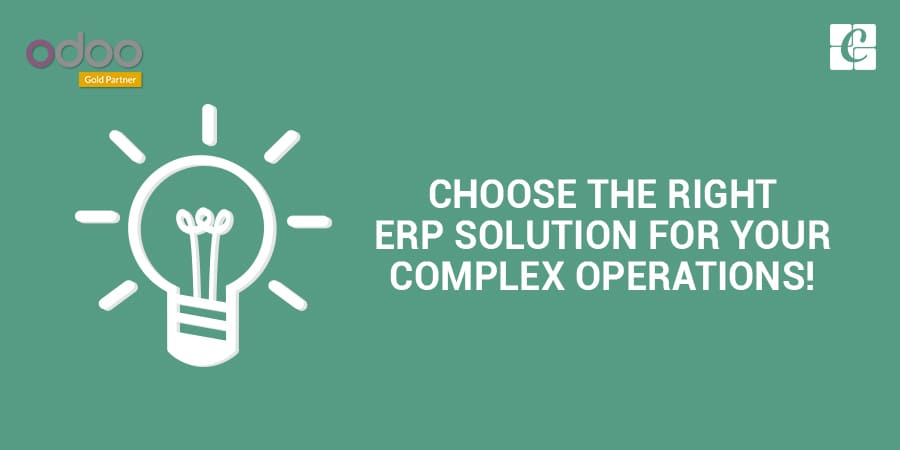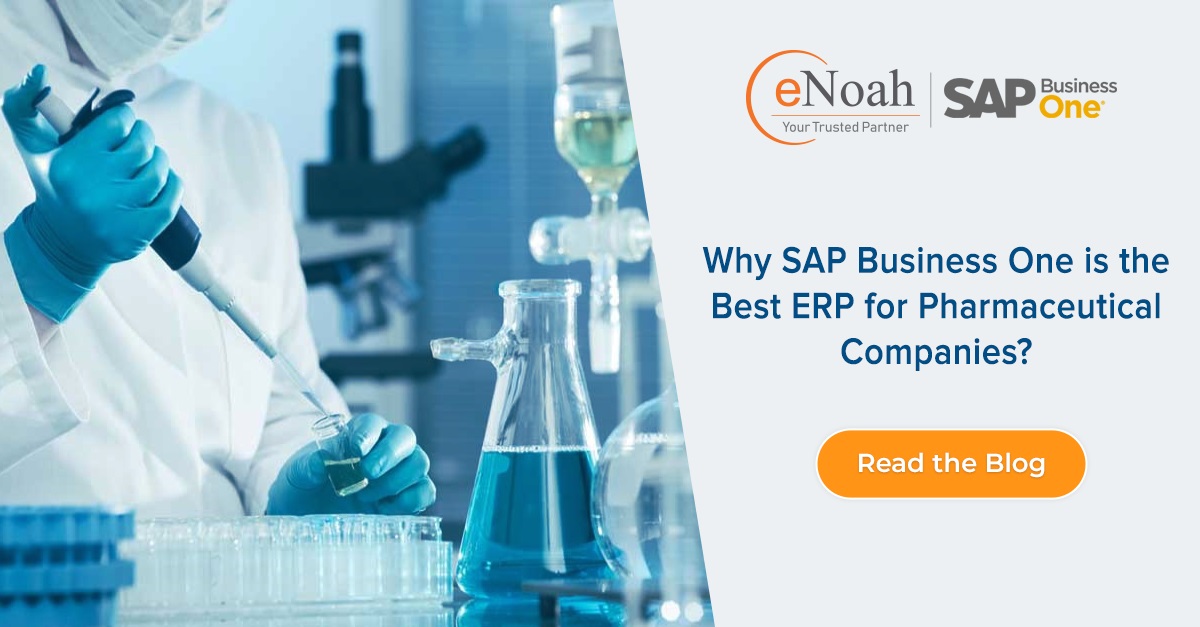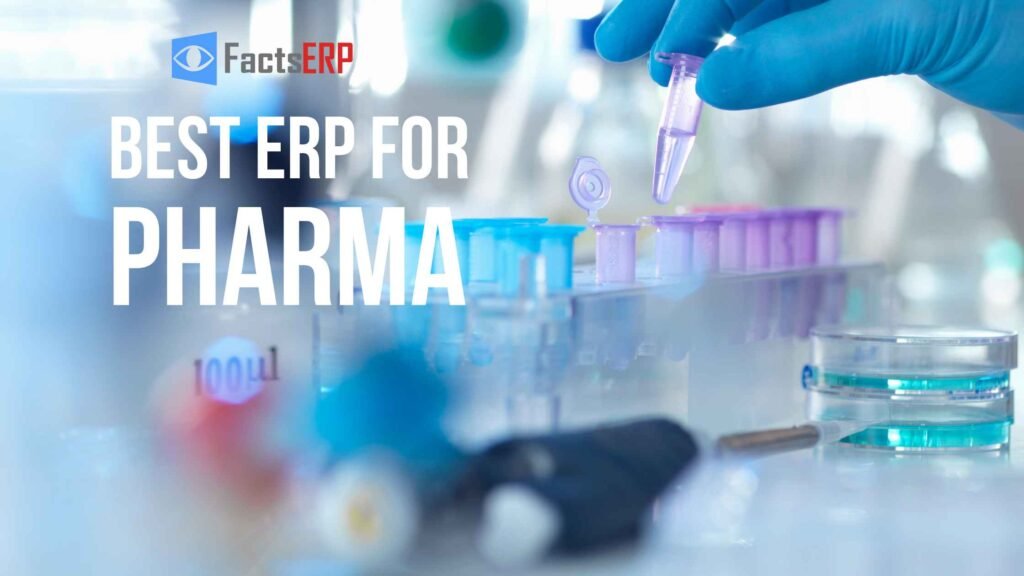Navigating the Complexities of Pharmaceutical Operations: Choosing the Right ERP Solution
 .
.
Welcome, fellow pharmaceutical industry leaders! In the ever-evolving landscape of healthcare, where innovation and regulatory compliance intertwine, managing your operations with precision and efficiency is paramount. The pharmaceutical industry faces unique challenges, from intricate regulatory frameworks and stringent quality control measures to the delicate balance of research, development, and production.
In this dynamic environment, a robust Enterprise Resource Planning (ERP) system emerges as a vital tool, acting as the central nervous system for your organization. An ERP system integrates various aspects of your business, streamlining processes, optimizing resource allocation, and ultimately driving operational excellence.
However, choosing the right ERP solution for your pharmaceutical company is no easy feat. With a plethora of options available, each boasting its own set of features and functionalities, the decision can feel overwhelming. This comprehensive guide aims to demystify the process, equip you with the knowledge to make an informed choice, and ultimately, help you find the ERP solution that aligns perfectly with your unique needs and aspirations.
We will delve into the intricacies of ERP systems tailored for the pharmaceutical industry, exploring their advantages, disadvantages, and essential considerations. We will dissect the key features and functionalities that should be at the forefront of your selection criteria, ensuring you choose a system that empowers you to navigate the complexities of your operations with confidence.
 .
.
This guide is more than just a technical overview. We will delve into the practical implications of implementing an ERP system, highlighting the potential benefits and challenges you might encounter. We will also address common concerns and answer frequently asked questions, providing you with the clarity and insights needed to make a decision that drives long-term success.
So, let’s embark on this journey together, exploring the world of pharmaceutical ERP solutions and uncovering the key to unlocking your organization’s true potential.
Understanding the Pharmaceutical Industry’s Unique Needs
The pharmaceutical industry operates within a complex and highly regulated environment, demanding a level of precision and accountability that is unmatched in other sectors. This necessitates an ERP system that is specifically designed to address the industry’s unique challenges and complexities.
1. Regulatory Compliance: Pharmaceutical companies must adhere to a stringent web of regulations, including the Good Manufacturing Practices (GMP), Good Laboratory Practices (GLP), and Good Clinical Practices (GCP). These regulations govern every aspect of drug development, production, and distribution, demanding meticulous documentation, traceability, and adherence to strict quality control measures.
2. Data Integrity and Security: The pharmaceutical industry handles highly sensitive data, including patient information, clinical trial data, and confidential research findings. Maintaining the integrity and security of this data is paramount, requiring an ERP system that incorporates robust security features and data encryption protocols.
 .
.
3. Supply Chain Management: The pharmaceutical supply chain is a complex network, encompassing raw material sourcing, manufacturing, packaging, distribution, and ultimately, delivery to patients. Managing this intricate chain requires an ERP system that provides real-time visibility into inventory levels, production schedules, and delivery timelines, enabling efficient logistics and minimizing disruptions.
4. Quality Control and Traceability: Ensuring the quality and safety of pharmaceutical products is paramount. An ERP system must facilitate rigorous quality control processes, enabling seamless tracking of materials, batches, and products throughout their lifecycle. This includes detailed documentation, batch traceability, and comprehensive quality control reporting.
5. Research and Development: Pharmaceutical companies invest heavily in research and development, seeking to innovate and bring new therapies to market. An ERP system should support this critical function by facilitating collaboration among research teams, managing intellectual property, and streamlining the development process.
6. Financial Management: The pharmaceutical industry faces complex financial challenges, including managing budgets, tracking expenses, and adhering to regulatory requirements. An ERP system must provide robust financial management tools, enabling accurate forecasting, budgeting, and reporting.
7. Customer Relationship Management (CRM): Building strong relationships with healthcare professionals, patients, and other stakeholders is crucial in the pharmaceutical industry. An ERP system with integrated CRM capabilities can help you manage interactions, track customer feedback, and optimize marketing campaigns.
 .
.
Key Features of a Pharmaceutical ERP System
Selecting the right ERP system for your pharmaceutical company requires careful consideration of the essential features and functionalities that will empower your operations. Here are some key features to look for:
1. Regulatory Compliance and Validation: The ERP system should be designed to meet the stringent regulatory requirements of the pharmaceutical industry. This includes features for managing documentation, tracking batch numbers, and ensuring complete traceability. The system should also be validated to meet industry standards, demonstrating its reliability and compliance.
2. Quality Management System (QMS): A comprehensive QMS is essential for maintaining product quality and ensuring compliance. The ERP system should integrate with your QMS, providing tools for managing quality control processes, conducting audits, and tracking corrective and preventive actions.
3. Electronic Batch Records (EBR): EBRs are crucial for ensuring the accuracy and traceability of manufacturing processes. The ERP system should enable the creation, management, and electronic signing of EBRs, eliminating the need for manual documentation and reducing the risk of errors.
 .
.
4. Supply Chain Management: A robust supply chain management module is essential for managing inventory, tracking shipments, and ensuring timely delivery of products. The ERP system should provide real-time visibility into inventory levels, production schedules, and delivery timelines, enabling efficient logistics and minimizing disruptions.
5. Research and Development (R&D) Management: For companies engaged in R&D, the ERP system should provide tools for managing research projects, tracking intellectual property, and collaborating with research teams. The system should also integrate with laboratory information management systems (LIMS) for seamless data management.
6. Financial Management: The ERP system should provide comprehensive financial management tools, including budgeting, forecasting, expense tracking, and reporting. The system should also integrate with accounting software for seamless financial consolidation.
7. Customer Relationship Management (CRM): An integrated CRM module can help you manage interactions with healthcare professionals, patients, and other stakeholders. The system should provide tools for tracking customer feedback, managing marketing campaigns, and analyzing sales data.
8. Reporting and Analytics: The ERP system should provide powerful reporting and analytics capabilities, enabling you to gain insights into your operations, identify trends, and make informed decisions. The system should offer customizable dashboards and reports, allowing you to tailor the information to your specific needs.
 .
.
9. Integration with Other Systems: The ERP system should seamlessly integrate with other systems used by your organization, such as laboratory information management systems (LIMS), warehouse management systems (WMS), and customer relationship management (CRM) systems. This ensures data consistency and eliminates the need for manual data entry.
10. Security and Data Integrity: The ERP system should incorporate robust security features, including access control, data encryption, and audit trails, to protect sensitive data from unauthorized access and ensure data integrity.
Advantages of Using an ERP System in the Pharmaceutical Industry
Implementing an ERP system can bring significant benefits to pharmaceutical companies, streamlining operations, improving efficiency, and enhancing compliance. Here are some key advantages:
1. Improved Efficiency: By automating processes and integrating data across departments, an ERP system can significantly improve efficiency throughout your organization. This includes streamlining workflows, reducing manual tasks, and eliminating data silos.
2. Enhanced Visibility and Control: An ERP system provides real-time visibility into key operations, including inventory levels, production schedules, and customer interactions. This allows you to monitor performance, identify bottlenecks, and make informed decisions to optimize your processes.
3. Increased Compliance: An ERP system designed for the pharmaceutical industry can help you meet the stringent regulatory requirements, ensuring data integrity, traceability, and compliance with GMP, GLP, and GCP guidelines.
4. Improved Data Accuracy and Consistency: By centralizing data and eliminating manual data entry, an ERP system can significantly improve data accuracy and consistency. This ensures that all departments are working with the same information, reducing the risk of errors and inconsistencies.
5. Better Decision-Making: With access to real-time data and powerful analytics tools, an ERP system can empower you to make better informed decisions. This includes identifying trends, predicting demand, and optimizing resource allocation.
6. Reduced Costs: By streamlining processes, improving efficiency, and minimizing errors, an ERP system can help you reduce operational costs. This includes reducing inventory carrying costs, minimizing waste, and streamlining logistics.
7. Improved Customer Satisfaction: By providing better service, faster delivery, and improved communication, an ERP system can enhance customer satisfaction. This includes providing real-time order tracking, managing customer inquiries efficiently, and ensuring timely product delivery.
8. Enhanced Collaboration: An ERP system can facilitate collaboration among departments, improving communication and coordination. This includes sharing information, tracking progress, and ensuring that everyone is working towards the same goals.
9. Scalability and Flexibility: A well-designed ERP system can grow with your business, providing the scalability and flexibility to adapt to changing needs and increasing volumes. This ensures that your system can support your future growth and expansion plans.
10. Competitive Advantage: By implementing an ERP system, you can gain a competitive advantage by streamlining operations, improving efficiency, and enhancing compliance. This can help you respond faster to market changes, reduce costs, and improve customer satisfaction.
Disadvantages of Using an ERP System in the Pharmaceutical Industry
While ERP systems offer numerous advantages, it’s important to be aware of potential disadvantages and challenges. Here are some factors to consider:
1. Implementation Costs: Implementing an ERP system can be a significant investment, requiring upfront costs for software licenses, hardware, and implementation services. It’s crucial to factor in these costs when making your decision.
2. Complexity: ERP systems can be complex, requiring specialized skills and knowledge to implement and manage effectively. This may necessitate hiring new personnel or training existing employees, adding to your overall costs.
3. Change Management: Implementing an ERP system involves significant organizational change, requiring buy-in from employees at all levels. This can be challenging, requiring effective communication, training, and support to ensure a smooth transition.
4. Data Migration: Migrating data from existing systems to the new ERP system can be a complex and time-consuming process. It’s essential to plan this carefully, ensuring data accuracy and integrity.
5. Customization: While some ERP systems offer customization options, tailoring the system to meet your specific needs can be costly and time-consuming. It’s important to consider the level of customization required and the associated costs.
6. Integration Challenges: Integrating the ERP system with other existing systems can be challenging, requiring careful planning and coordination. This can involve data mapping, API integration, and testing to ensure seamless data flow.
7. Vendor Dependence: Implementing an ERP system creates a dependency on the vendor for software updates, maintenance, and support. It’s important to choose a reputable vendor with a proven track record and reliable support services.
8. Security Risks: ERP systems store sensitive data, making them potential targets for cyberattacks. It’s crucial to choose a system with robust security features and to implement strong security protocols to protect your data.
9. User Adoption: Ensuring user adoption is crucial for the success of any ERP implementation. This requires providing adequate training, support, and ongoing communication to encourage employees to use the system effectively.
10. Return on Investment (ROI): While ERP systems offer numerous benefits, it’s important to measure the return on investment (ROI) to ensure that the investment is justified. This requires tracking key metrics, such as improved efficiency, reduced costs, and enhanced compliance.
Essential Considerations When Choosing an ERP System
Selecting the right ERP system for your pharmaceutical company is a critical decision. Here are some key considerations to guide your evaluation:
1. Industry Expertise: Look for an ERP vendor with proven experience in the pharmaceutical industry. They should understand the unique challenges and regulations, offering solutions specifically tailored to your needs.
2. Scalability and Flexibility: Choose a system that can grow with your business, providing the scalability and flexibility to adapt to changing needs and increasing volumes.
3. Regulatory Compliance: Ensure the ERP system meets the stringent regulatory requirements of the pharmaceutical industry, including GMP, GLP, and GCP guidelines.
4. Data Integrity and Security: Prioritize data integrity and security, selecting a system with robust security features, data encryption protocols, and audit trails.
5. Integration Capabilities: Choose a system that integrates seamlessly with other systems used by your organization, such as LIMS, WMS, and CRM systems.
6. User Interface and Usability: Select a system with a user-friendly interface and intuitive navigation, making it easy for employees to adopt and use effectively.
7. Reporting and Analytics: Look for a system with powerful reporting and analytics capabilities, enabling you to gain insights into your operations, identify trends, and make informed decisions.
8. Implementation Support: Choose a vendor that provides comprehensive implementation support, including training, documentation, and ongoing support services.
9. Vendor Reputation and Support: Select a vendor with a proven track record, reliable support services, and a strong reputation for customer satisfaction.
10. Cost and Return on Investment (ROI): Carefully evaluate the cost of the ERP system and the potential return on investment (ROI), considering the benefits and savings it can deliver.
Popular ERP Systems for the Pharmaceutical Industry
Several ERP systems are specifically designed for the pharmaceutical industry, offering a range of features and functionalities to meet the unique needs of this sector. Here are some popular options:
1. SAP: SAP is a global leader in enterprise software, offering a comprehensive ERP solution for the pharmaceutical industry. SAP’s industry-specific solutions address regulatory compliance, quality management, supply chain management, and financial management.
2. Oracle: Oracle is another major player in the ERP market, providing a wide range of solutions for the pharmaceutical industry. Oracle’s ERP system offers features for managing regulatory compliance, quality control, supply chain management, and financial management.
3. Microsoft Dynamics 365: Microsoft Dynamics 365 is a cloud-based ERP system that offers a comprehensive suite of solutions for the pharmaceutical industry. It includes features for managing regulatory compliance, quality management, supply chain management, and financial management.
4. Infor: Infor is a leading provider of industry-specific ERP solutions, including a dedicated solution for the pharmaceutical industry. Infor’s ERP system addresses regulatory compliance, quality management, supply chain management, and financial management.
5. Epicor: Epicor is a global provider of industry-specific ERP solutions, offering a comprehensive solution for the pharmaceutical industry. Epicor’s ERP system includes features for managing regulatory compliance, quality management, supply chain management, and financial management.
6. Acumatica: Acumatica is a cloud-based ERP system that offers a range of solutions for the pharmaceutical industry. Acumatica’s ERP system addresses regulatory compliance, quality management, supply chain management, and financial management.
7. NetSuite: NetSuite is a cloud-based ERP system that offers a comprehensive suite of solutions for the pharmaceutical industry. It includes features for managing regulatory compliance, quality management, supply chain management, and financial management.
8. Workday: Workday is a cloud-based ERP system that offers a comprehensive suite of solutions for the pharmaceutical industry. It includes features for managing regulatory compliance, quality management, supply chain management, and financial management.
9. Salesforce: Salesforce is a leading provider of cloud-based CRM solutions, offering a comprehensive suite of solutions for the pharmaceutical industry. Salesforce’s CRM platform can be integrated with ERP systems to manage customer interactions, track sales data, and optimize marketing campaigns.
10. Veeva: Veeva is a leading provider of cloud-based software solutions for the life sciences industry, including a comprehensive suite of solutions for the pharmaceutical industry. Veeva’s solutions address regulatory compliance, quality management, clinical trial management, and commercial operations.
The Importance of Choosing the Right ERP System
Selecting the right ERP system is a crucial decision for any pharmaceutical company. The right system can streamline operations, improve efficiency, enhance compliance, and ultimately drive success. However, choosing the wrong system can lead to costly mistakes, implementation challenges, and missed opportunities.
By carefully considering the factors discussed in this guide, you can make an informed decision and choose an ERP system that aligns with your unique needs and aspirations. Remember, the right ERP system is not just a software solution; it’s a strategic investment that can transform your organization and drive long-term success.
Frequently Asked Questions (FAQs)
1. What are the benefits of using an ERP system for the pharmaceutical industry?
ERP systems offer numerous benefits for pharmaceutical companies, including improved efficiency, enhanced visibility and control, increased compliance, improved data accuracy and consistency, better decision-making, reduced costs, improved customer satisfaction, enhanced collaboration, scalability and flexibility, and a competitive advantage.
2. What are the key features to look for in a pharmaceutical ERP system?
Key features include regulatory compliance and validation, a Quality Management System (QMS), Electronic Batch Records (EBR), supply chain management, research and development (R&D) management, financial management, customer relationship management (CRM), reporting and analytics, integration with other systems, security and data integrity, and user interface and usability.
3. What are some popular ERP systems for the pharmaceutical industry?
Popular options include SAP, Oracle, Microsoft Dynamics 365, Infor, Epicor, Acumatica, NetSuite, Workday, Salesforce, and Veeva.
4. How can I choose the right ERP system for my pharmaceutical company?
Consider factors such as industry expertise, scalability and flexibility, regulatory compliance, data integrity and security, integration capabilities, user interface and usability, reporting and analytics, implementation support, vendor reputation and support, cost, and return on investment (ROI).
5. What are the challenges of implementing an ERP system in the pharmaceutical industry?
Challenges include implementation costs, complexity, change management, data migration, customization, integration challenges, vendor dependence, security risks, user adoption, and return on investment (ROI).
6. How can I ensure a successful ERP implementation in my pharmaceutical company?
Key steps include planning carefully, involving key stakeholders, providing adequate training, managing change effectively, and measuring the return on investment (ROI).
7. What are the best practices for managing an ERP system in the pharmaceutical industry?
Best practices include regular maintenance and updates, data backups and disaster recovery planning, user training and support, and ongoing monitoring and evaluation.
8. What are the trends in pharmaceutical ERP systems?
Trends include cloud-based ERP systems, mobile accessibility, artificial intelligence (AI) integration, and advanced analytics capabilities.
9. What is the future of ERP systems in the pharmaceutical industry?
The future of ERP systems in the pharmaceutical industry lies in continued innovation, integration with emerging technologies, and a focus on data-driven decision-making.
10. How can an ERP system help pharmaceutical companies improve patient safety?
ERP systems can help improve patient safety by enhancing traceability, ensuring product quality, and facilitating efficient recall management.
11. What are the regulatory considerations for using an ERP system in the pharmaceutical industry?
Regulatory considerations include compliance with GMP, GLP, and GCP guidelines, data integrity and security requirements, and validation requirements.
12. How can an ERP system help pharmaceutical companies improve their supply chain?
ERP systems can improve supply chain management by providing real-time visibility into inventory levels, production schedules, and delivery timelines, enabling efficient logistics and minimizing disruptions.
13. What are the benefits of using a cloud-based ERP system for the pharmaceutical industry?
Cloud-based ERP systems offer numerous benefits, including scalability, flexibility, cost-effectiveness, and ease of implementation.
Conclusion: Embracing the Power of ERP for a Brighter Future
As we conclude our exploration of ERP systems for the pharmaceutical industry, one key takeaway emerges: the right ERP solution is not just a technology; it’s a strategic asset that can transform your organization, drive efficiency, and unlock your full potential.
By embracing the power of ERP, you gain access to a comprehensive platform that integrates your operations, streamlines processes, and empowers you to navigate the complexities of the pharmaceutical landscape with confidence. This translates to a more efficient and compliant organization, better equipped to meet the evolving demands of the industry and deliver on its mission of improving patient lives.
The journey to selecting and implementing an ERP system is not without its challenges. However, with careful planning, informed decision-making, and a commitment to leveraging the system’s full capabilities, you can ensure a successful implementation that delivers tangible benefits and paves the way for a brighter future.
Remember, the choice of an ERP system is not a one-size-fits-all solution. Your unique needs, goals, and operating environment will dictate the best fit for your organization. Take the time to research, evaluate, and select a system that aligns with your vision and empowers you to achieve your goals.
This guide has equipped you with the knowledge and insights to embark on this journey with confidence. Now, it’s time to take action, explore the available options, and choose the ERP system that will propel your pharmaceutical company to new heights of success.
Disclaimer: This article is intended to provide general information and should not be considered professional advice. The information provided is for informational purposes only and does not constitute legal, financial, or medical advice. It is essential to consult with qualified professionals for specific guidance tailored to your individual circumstances. The author of this article is not responsible for any actions taken based on the information provided.
 .
.

